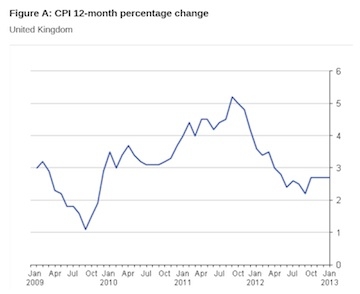
Tuesday, 12 February 2013 10:39
CPI inflation remains unchanged at 2.7 per cent

Consumer prices index inflation remained at 2.7 per cent in January, according to the Office for National Statistics.
This figure is unchanged for four months, the longest period CPI has remained the same.
The largest upward pressures came from alcohol, where prices rose by 4.3 per cent due to prices recovering after Christmas, and airfares.
The ONS said: "Air fares pushed inflation upwards with prices falling less than they usually do in January following the lower than usual price increases in December 2012. This upward push was partially counterbalanced by downward pressures from the majority of the remainder of the transport sector, notably car sales and motor fuel."
{desktop}{/desktop}{mobile}{/mobile}
Downward pressures came from miscellaneous goods and services including financial services fees, which fell by 0.7 per cent compared with a smaller fall of 0.1 per cent a year ago, and clothing and footwear, where prices fell by 5.4 per cent.
The Bank of England has said it expects inflation could remain above its two per cent target for the next two years.
The retail prices index stood at 3.3 per cent, up from 3.1 per cent in December.
Next month will see the addition of the new CPIH and RPIJ measures which will take into account the cost of living and owning a home.
Commenting on the figures, Stephen Jones, joint head of fixed income at Kames Capital, said: "The stability in today's CPI figures mask the fact that despite weak demand and levels of economic activity in the UK economy, inflation remains stubbornly high and above the desired target rate.
"Both sets of inflation data are running at higher levels than pay increases and reflect a continuing squeeze on households and businesses who don't have pricing power in the weak demand environment."
Vince Smith-Hughes, retirement expert at Prudential, said: "Since the start of 2008, inflation has caused prices to rise by roughly 22.7 per cent, putting a lot of pressure on household budgets. Pensioners in particular are disproportionately affected, partly because the prices of the goods they buy most, like food and fuel, are rising rapidly. It's also because the average expected income has really taken a tumble in recent years."
There will be an inflation report published by the Bank of England on 13 February and the next inflation figures will be published on 12 March 2013.
• Want to receive a free weekly summary of the best news stories from our website? Just go to home page and submit your name and email address. If you are already logged in you will need to log out to see the e-newsletter sign up. You can then log in again.
This figure is unchanged for four months, the longest period CPI has remained the same.
The largest upward pressures came from alcohol, where prices rose by 4.3 per cent due to prices recovering after Christmas, and airfares.
The ONS said: "Air fares pushed inflation upwards with prices falling less than they usually do in January following the lower than usual price increases in December 2012. This upward push was partially counterbalanced by downward pressures from the majority of the remainder of the transport sector, notably car sales and motor fuel."
{desktop}{/desktop}{mobile}{/mobile}
Downward pressures came from miscellaneous goods and services including financial services fees, which fell by 0.7 per cent compared with a smaller fall of 0.1 per cent a year ago, and clothing and footwear, where prices fell by 5.4 per cent.
The Bank of England has said it expects inflation could remain above its two per cent target for the next two years.
The retail prices index stood at 3.3 per cent, up from 3.1 per cent in December.
Next month will see the addition of the new CPIH and RPIJ measures which will take into account the cost of living and owning a home.
Commenting on the figures, Stephen Jones, joint head of fixed income at Kames Capital, said: "The stability in today's CPI figures mask the fact that despite weak demand and levels of economic activity in the UK economy, inflation remains stubbornly high and above the desired target rate.
"Both sets of inflation data are running at higher levels than pay increases and reflect a continuing squeeze on households and businesses who don't have pricing power in the weak demand environment."
Vince Smith-Hughes, retirement expert at Prudential, said: "Since the start of 2008, inflation has caused prices to rise by roughly 22.7 per cent, putting a lot of pressure on household budgets. Pensioners in particular are disproportionately affected, partly because the prices of the goods they buy most, like food and fuel, are rising rapidly. It's also because the average expected income has really taken a tumble in recent years."
There will be an inflation report published by the Bank of England on 13 February and the next inflation figures will be published on 12 March 2013.
• Want to receive a free weekly summary of the best news stories from our website? Just go to home page and submit your name and email address. If you are already logged in you will need to log out to see the e-newsletter sign up. You can then log in again.
This page is available to subscribers. Click here to sign in or get access.
